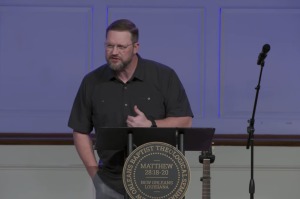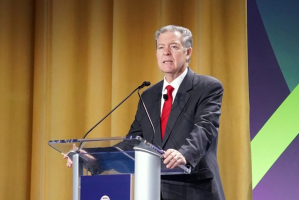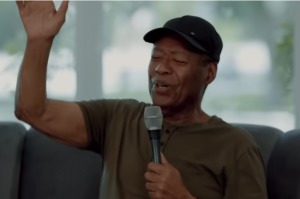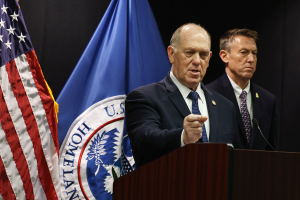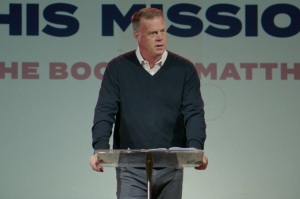Interview: Larry Crabb on Why He Doesn't Like Church
For years a war was raging inside him, but outwardly the Christian author sat in church and pretended all was well. Now he is ready to reveal his secret – he doesn't want to go to church anymore.
Dr. Larry Crabb, a psychologist by profession, spoke to The Christian Post this past week about his struggles with the church and what he learned in his quest for the "real church" as revealed in his latest book Real Church: Does it exist? Can I find it?.
The following are excerpts from the interview.
CP: We often hear about the younger generation not finding church relevant to their lives or just plain boring, but from people in their 60's – that's not often heard about. How pervasive is this problem? I'm curious to know how widespread do you think this problem is for your age group.
Crabb: I think it is a whole lot more pervasive than people presume. I have been talking about this for a year or so since the book has come out and I have been sharing this with many of my peers. I don't think I've met one person yet – I'm talking about anecdotal research here so it's not formal – in about 40 to 50 people I've talked to who have responded, "My gosh, what is your problem. I love church!"
The response I'm getting at the positive end of the spectrum is, "Well, we still go and we think it's a good thing. I don't think it's doing what it is supposed to be doing. I know we're supposed to be asking what we can give to church not what we can get from church but I don't feel like I want to even give anything anymore." I hear a lot of that.
At the other extreme what I'm hearing a fair amount of people say includes the words boredom or indifference to describe church. When Sunday morning comes do they go to church, "Well, yeah we probably should but if not, no big deal."
I think it is rather a widespread thing that people in my generation are not comfortable enough or maybe not open enough to make known how they feel about church, while young people are much more willing to share their opinions.
CP: What is it that you dislike so much about most churches?
Crabb: I think that is putting it too strongly. I am not sure I would say what I dislike, but more of what I find missing or disappoints me is a better way of putting it. If I had to say it in just one thought it would be this. I am fighting a battle within me that I believe everyone is fighting. It is not just because I am messed up and no one else is. They are deep internal battles that have to do with God and his plans for our lives and the Gospel. I don't find the church taking into account in most of their activities what is going inside of me and my struggles.
I go to a church and most of the time the worship team gets up there and is smiling and singing their heads off and everyone is raising their hands and a lot of people is saying I will just take this as my weekly drug to feel good for a time. I would love to see a pastor or worship leader get up and say, "I don't know what is happening in you. I would think that maybe we can find a reason for joy and praise. I don't know where you are, but we want to meet you exactly where you are and whatever you're going through."
I don't hear that in a meaningful sense when I go to most churches. So that would be the one major thing that I am concerned with – dealing with battles going on in the soul.
CP: In the book, you often criticized many churches for being a "self-help club." What is wrong with a church helping its members? Could you explain?
Crabb: Nothing is wrong with churches helping its members, but the question is helping them with what. If a person came to me and wanted to rob a bank and said would you help me I don't know how. I would say I don't want to help you with that. And I think when we come to God and say to Him, I want help in feeling the way I want to feel all the time, God responds, "I want to help you but I don't want to help you with that. I want to help you with something far deeper, with something that is really wrong in your life because I have in mind for you to be full of joy. You are not going to be full of joy if you have this entitled spirit of feeling good and I'm supposed to bless you and seeing me as nothing but Santa Claus and its Christmas time." That is not who God is.
I would never say it is wrong for churches to want to help people, just the opposite. But I would want a church to help people with what God provides. We need to be very clear on if it is the help God wants to give and not distort it into something that in our sinfulness and selfishness is going to demand and feel entitled to. Nothing is wrong with helping people, but everything is wrong with helping people in moving in directions God is not intending to go.
CP: In your opinion, what does the "real" church look like?
Crabb: The real church looks like where four things are happening. Number one, if I were involved in a real church over a ten year period I would have been immersed in the Bible. I would have a strong sense of what I call spiritual theology. I want to hear my pastor, my Sunday school teacher, my small group leader, my friends help me and join me in discovering the incredible story God is telling and how he is telling it and what he is saying in all 66 love letters. I don't think we are hearing that. I think we are hearing a lot of self-help tips and here is a verse that might help you this week instead of the story God is telling.
Point two, you are designed - this would be the church talking - to be the greatest lover of all time. You were designed to move toward other people when they let you down, when you are discouraged. You are designed to actually be formed in the image of Jesus Christ who was able to love people when he was rejected, when he was nailed to the cross. So the second thing is spiritual formation. I want a church that helps me to know what it means to be profoundly spiritually formed, and that means taking on the real battle because every body is spiritually deformed. I think we are all fundamentally self-centered, and to be other-centered is a battle.
Point three is that that cannot be done outside of a spiritual community. So first spiritual theology, the story of God that is exciting; second spiritual formation, being changed from a narcissist into a giver and lover; and point three, spiritual community, can I be in a group of Christians where whether it is Sunday morning or in my small group or hanging out with Christians in a coffee shop, can I be occupied with developing the kind of community that is so profoundly authentic that we share where we are in the journey even when we are not doing well. So a spiritual community is where we can experience the incredible privilege of looking bad in the presence of love. I think in so many churches we have a community of pretenders as opposed to a community of the broken. So the third is spiritual community that lets us be where we are but loves us too much to leave us there.
The fourth thing is a real church would be occupied with spiritual mission that if I do hear the story of God, spiritual theology, if I do deal with the battle in my the soul so I can become more like Jesus, spiritual formation, and if I do it in an honest, authentic community, spiritual community, then I will have the desire to reach out to my neighbors with the love of God. I might be interested in going to New Orleans when Katrina hit. I might be concerned about homeless and hungry people in Africa. I might have something inside me that wants to move towards them with the love of Christ, which is spiritual mission.
I think these are the design that I believe God has for a local community of believers.
CP: Who is mainly responsible for changing a "fake" church into a "real" church? Is it the pastor, the deacons, the members?
Crabb: One thing I hope my book does not do is to turn disgruntle Christians into angry Christians who go out and bash their pastor. But I hope the book would encourage whoever reading it, pastor or member, to ask how can I contribute to how a real church is. Even a person who shows up on Sunday morning, what would it mean for me to be authentic with somebody? So I think anybody has the opportunity to move towards this. But clearly the leadership of the church, they do have the greatest opportunity to transform things.
CP: Earlier in the book you discuss problems you see in the missional church model, but towards the end of the book you seem more favorable towards it. Could you clarify your position on the missional church?
Crabb: I think the word missional is a wonderful word. I think we are all called to a mission because the missional church very rightly says that when Jesus left he said go out and make disciples. I am sending you on a mission. And the missional church goes, "My gosh, let's take that seriously." And I completely agree with that because it is in the Bible.
But my concern with the missional church is when we emphasize the missional aspect and make that the center, which is what the missional church often does, my thought is amen to that but what about the amount of preparation it takes inside of Christians to do that well.
I don't see the level of immersion in the scripture. Often times I think the idea of spiritual formation is short-circuited in order to get people out doing stuff. I rather have them say we have to deal with what is going on in your soul before you run out and be missional. If you aren't able to love your wife very well, you aren't going to be all that missional. So you better learn to be other-centered in your primary relationships. And I just don't hear that emphasized enough.
And I don't think spiritual community reaches the level of authenticity that I have in mind. The missional church is so focused on the mission that I don't think they are tending to the necessary preparation for missionaries. If someone says Africa is a continent full of sick people, I hope the person who goes to Africa attends medical school first.
CP: Is there anything you want to add?
Crabb: If I really have my way, if I had one prayer request that God would answer for this book, it would be that when people finish reading it that they don't just end up being critical of their church or pastor, or angrier or lonelier than they were before, but they would realize that the spirit of God is in every Christian person. If the spirit of God is in everybody, then every Christian has the opportunity to represent Christ in their community.
I hope that people would leave with the sense of excitement that there is a huge story going on that is unseen, but those listening to God will hear it. There is a huge opportunity to become a very different man or woman, somebody who is willing to give all they have for the sake of another. Abandoning myself for your sake, that is the opportunity of Christianity and not just to have a blessed life.
I hope people get away from the idea that God is a genie that you rub a lamp and call it a prayer and you get everything you want. That is not how it works at all. But rather we have the chance to move into the world with the attitude of Christ. I just hope people would see this is an incredible privilege that there is a vision for the church that is so high and lofty that it is only possible only through people who are fully dedicated to Christ. Hopefully we will get people moving in that direction.















